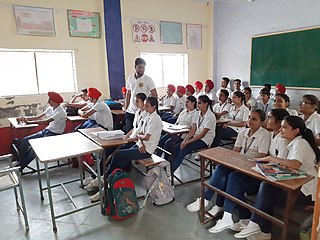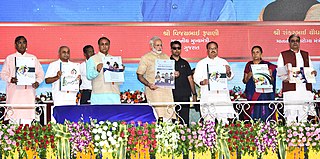
Education in India is primarily managed by the state-run public education system, which falls under the command of the government at three levels: central, state and local. Under various articles of the Indian Constitution and the Right of Children to Free and Compulsory Education Act, 2009, free and compulsory education is provided as a fundamental right to children aged 6 to 14. The approximate ratio of the total number of public schools to private schools in India is 10:3.

Kandukuri Veeresalingam was a social reformer and writer from the Madras Presidency, British India. He is considered as the father of the Telugu Renaissance movement. He was one of the early social reformers who encouraged the education of women and the remarriage of widows. He also fought against child marriage and the dowry system. He started a school in Dowlaiswaram in 1874, constructed the 'Brahmo Mandir' in 1887 and built the 'Hithakarini School' in 1908 in Andhra Pradesh. His novel Rajasekhara Charitramu is considered to be the first novel in Telugu literature.

The Wilson College, established in 1832 in Mumbai, is one of India's oldest colleges; its foundation precedes that of the University of Mumbai, to which it is affiliated, by 25 years. Wilson College was granted autonomy by Mumbai University in November 2021. It was awarded an A rating by the National Assessment and Accreditation Council (NAAC) in 2005.
The Atheist Centre is an institution founded by Goparaju Ramachandra Rao and Saraswathi Gora (1912–2006) to initiate social change in rural Andhra Pradesh based on the ideology of Gandhism and atheism. Founded in 1940 at Mudnur village in Krishna district in Andhra Pradesh, India the Centre was later shifted to Vijayawada in 1947. As a member organisation of the Federation of Indian Rationalist Associations, the Atheist Centre endorses the Amsterdam Declaration 2002. The institution received the International Humanist and Ethical Union's International Humanist Award in 1986 for pioneering in the field of social work. After the Indian Ocean tsunami, the Atheist Centre worked with the Institute for Humanist Studies to provide aid to the victims of the disaster.
World Vision India, headquartered in Chennai, is a christian charitable organisation, registered as a society under the Societies Registration Act of Tamil Nadu 1975. The organisation's primary stated goals are Child and Social Welfare.

Literacy in India is a key for social-economic progress. The 2011 census, indicated a 2001–2011 literacy growth of 97.2%, which is slower than the growth seen during the previous decade. An old analytical 1990 study estimated that it would take until 2060 for India to achieve universal literacy at then-current rate of progress.

Kailash Satyarthi is an Indian social reformer who campaigned against child labor in India and advocated the universal right to education.
Eklavya is an Indian NGO based in Bhopal, Madhya Pradesh working in the field of education. It was registered as an all India in 1982. The organization is named after Eklavya, the protagonist of a story in the Mahabharat, for his determination to learn even in the absence of a teacher.
The state of Uttar Pradesh had a small tradition of learning, although it had remained mostly confined to the elite class and the religious establishment.
Children's Indradanush is a children's publication run by activists of All India People's Science Network (AIPSN). The meaning of the title is "Rainbow".

Activity-based learning, or ABL, describes a range of pedagogical approaches to teaching. Its core premises include the requirement that learning should be based on doing hands-on experiments and activities. Activity-based learning is rooted in the idea that children are active learners rather than passive recipients of information. If children are provided the opportunity to explore on their own and are provided with an optimum learning environment, then learning becomes more joyful and long-lasting.
Vidyaben Shah was an Indian social worker and activist known for her work with children, women and the elderly in India. While she was already serving as Vice-President, she was appointed the first non-officio President of the New Delhi Municipal Council (NDMC) by Prime Minister Indira Gandhi in 1975. She has held several leading positions in the field of social welfare since the 1940s. Vidyaben Shah died at the age of 97 on 19 June 2020 at her residence in Delhi, her son Mihir Shah confirmed the news of Vidyaben Shah death.

Azim Premji University is an Indian non-profit private university, located in Bengaluru, Karnataka. It was established by the Azim Premji University Act (2010) and recognised by the University Grants Commission under Section 2F.
Mathrubhumi Azhchappathippu is an Indian general interest weekly magazine published by the Mathrubhumi Printing and Publishing Company in Calicut. The Malayalam language magazine started publishing on 18 January 1932.

Mission Indradhanush is a health mission of the Government of India. It was launched by Union Health Minister J. P. Nadda on 25 December 2014. The scheme this seeks to drive towards 90% full immunisation coverage of India and sustain the same by year 2022. Vaccination is being provided against eight vaccine-preventable diseases nationally, i.e. Diphtheria, Whooping Cough, Tetanus, Polio, Measles, severe form of Childhood Tuberculosis and Hepatitis B and meningitis & pneumonia caused by Haemophilus influenza type B; and against Rotavirus Diarrhea and Japanese Encephalitis in selected states and districts respectively.
Chakmak is a children's science monthly magazine published by Eklavya foundation, a non-profit organization to support critical and creative thinking in schools.

Ramadas Panemangalore Shenoy was an Indian defence scientist and writer, known for his contributions in the field of radar technology. He secured a doctoral degree in electrical engineering from the University of Wisconsin–Madison and joined Defence Research and Development Organization in 1961, involving himself with the indigenous development of radar technology till his retirement, as a Distinguished Scientist, in 1989.
Sanctuary Nature Foundation is an Indian nonprofit foundation that was founded in 2015 building on the work of Sanctuary Asia, a wildlife magazine that was launched in 1981 by Bittu Sahgal. Its network of conservationists, naturalists, scientists, writers and photographers run various projects in environmental policy, advocacy, science, on-ground support, wildlife habitat management and more. The foundation also holds annual awards to honour grassroots conservationists and wildlife photographers.
Milaan Foundation is a non-governmental organization co-founded by Dhirendra Pratap Singh and Sharat Goswami in 2007, headquartered in Gurgaon, India. The foundation advocated the continuation of secondary education and the health of adolescent girls. It also focuses on preventing child marriage and gender-based violence for adolescent girls from low-socio-economic communities in India. It supports education for underprivileged girls and also works to bring awareness about menstrual health and hygiene among women in India.








